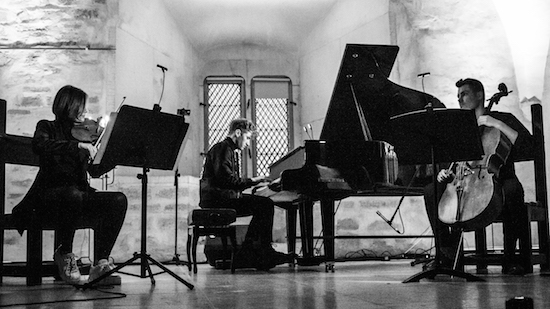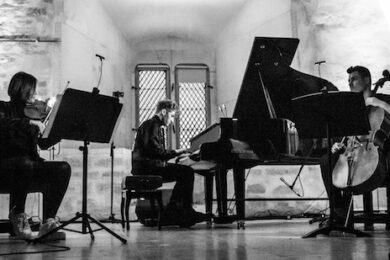All live photography by Masha Kunina
Is This A Music Festival?
A gloomy Saturday afternoon. I am standing on a very wet and soon-to-be wetter promontory that once was a series of jetties, in an interzone between Russia and Estonia. Surrounding me on opposite banks are rows of low sheds that face onto the water’s edge; each equipped with a primitive launch. Many of the sheds are open and populated with handy looking owners, who are busy revving their boat engines, grilling fish or washing down jars of pickled veg with a glug of vodka. It’s a weird scene. Weirder still, nestling rather dourly under a cats’ cradle of rusting Soviet power lines, is a stage where Asian Dub Foundation are about to play a set supporting the global Climate Change protests.
This remarkable spot is known as the Venice Of Narva. Music brought me here, but I am beginning to feel like Terry felt in the Likely Lads film; “None the bloody wiser.” Still, people mill about and have a lot of fun and make new friends (including NATO Battlegroup lads having a day out), whilst ADF play a very spaced out instrumental set that includes their track about the Kursk submarine tragedy. The deep bass sound conjured up by the stripped down Foundation rumbles around the space like a heavy piece of military metal. After watching, we tramp through the gloaming to a part of the gigantic C19 Krenholm cotton complex to take in a learned manifesto concerning Narva’s urban regeneration, based on a recent PhD research paper. Are we actually at a music festival?
Well, yes. It’s just that Station Narva employs music in radically different ways. Of course, there are some belting gigs over the two days, but there is also a palpable feeling that music is the midwife to something other than cosy chats about streaming or licensing deals. Total commitment to a different cause is expected. Even if I am just here to review I feel I have some part to play in giving this border city – one in which its citizens may feel a wry sense of remove about the machinations of both modern Russia and Estonia – my full support. This involves inspirational talks, charity runs, poetry slams, midnight trips to a light installation in the gloriously Dickensian Krenholm and gatecrashing a body movement workshop at the arts centre.
Funnily enough, when the music does take the spotlight, it does so in a classic rock & roll way, weirdly evoking World Of Twist’s epic single, ‘Sons Of The Stage’. Narvans got down to the noise and confusion with increasing abandon during monumental gigs by GusGus, Aisha Devi and Hatari in the spanking new Vaba Lava centre; with each act wanging the stagecraft up to Nigel Tufnel levels. All three instantly realise the audience want a good time, and to feel they too can dance to the beat of the world’s drum, like their more privileged western counterparts. With this in mind, it is great to see the audience gawping at Devi’s glorious otherness in total contrast to their surrender to GusGus’s inclusive, velvet-smooth, good-time vibes. And Hatari’s show, a magnificent C21st stew of New Beat, ramped up, Virgin Prunes aggression, Industrial noise and Attic Greek Tragedy has the crowd’s eyes on stalks. This embracing of pop music as a two-way, participatory spectacle hits a peak with a glorious show by Asian Dub Foundation, whose groovy, goofy, playful music jump-starts a borderline riot. Belting out tracks such as ‘Fortress Europe’ – and yelling, in unison, “bring down the borders of Fortress Europe” – sparks an explosion of unhinged, crazed dancing I haven’t seen in years. After that everyone piles down to the wild Club Ro Ro to watch an impromptu fire dance display from a bunch of lads who’ve turned up with the necessary inflammables. Just for the crack, like. Not a boutique, chin-stroking vinyl owner in sight.

Your New Favourite Band Is KEETAI And Inturist/On The Go
Me and the mighty John Robb of Louder Than War and Membranes fame are squeezed into the tiny and feisty Ro Ro club. We can’t take our eyes off a burly lad with hands like shovels, who is busy coaxing a noise out of his bass that I can only describe as a neverending wobble. His tough-looking mate on drums tries to summon up the restless ghost of ADII’s Peter Leopold. They are joined by a third, waif-like creature, who’s bent over a cluster of electronic gadgetry, breaking off from nob twiddling now and again to emit the sort of blood curdling howls that could bring down the jets flying over St Petersburg. A fourth hairy, who’s been stashed away in a cubby hole joins in, making yet more racket courtesy of guitar and extra leccy gear. He sometimes falls over.
This is KEETAI and they look and sound amazing and absolutely nothing like the KEETAI I saw at Tallinn Music Week some 6 months previous. The set here – in contrast to the glorious cello-based Gong-style wig outs I witnessed in the capital – is a mix of witch house noise, Know-era Faust (that bass wobble I tell thee), early Swans’ Yank-goth punk and a smidgeon of the Box Records aesthetic. It’s all wrapped in the most passive-aggressive-provincial pop sweet wrapper imaginable. At times the tension is unbearable, specifically the opening number, which is continually on the point of exploding over what feels like a full ten minutes of false starts. People walk out with an embarrassed half-smile on their face. They know this music is great, they just can’t take it. KEETAI are show-stopping in their nonchalance and focus, and even MOJA’s marvellous noise attack straight afterwards can’t shake off the feeling I’ve seen the most out-there gig of the weekend. Mart Avi, Estonia’s pop producer and crooner sans pareil advises me not to bother listening to their Bandcamp as it’s utterly unrepresentative of an act that seems to change every week.
Other acts of brilliant musicianship that open up third eyes are committed by Inturist, or rather an Inturist without “Mr Inturist” Jenya Gorbunov. The usual nonsense with getting visas out of Russia has struck again; with the band crazily reduced to just Dima Midborn on bass and Sergei Khramtcevich on baritone sax. This means that Inturist become On-The-Go (Dima Midborn’s admittedly excellent project) with bits of Inturist’s set thrown in. See it as a visa-driven Ralf & Florian situation. A nondescript afternoon gig in an arts centre must have put some wind in their sails however, as their night-time slot was the stuff of dreams. The duo waltzed on as if nothing is out of the ordinary and lay down a beautifully serene, sometimes sex-laden goth-jazz revue. Khramtcevich’s propitious parps, honks and blurts tap out a flexible percussive framework that allow the elegant Midborn’s mellifluous playing room to create melody, texture and tone. The bunch working round Inturist and the dark jazz scene are really one of Moscow’s great secrets, full of musicians able to reassemble and react in any situation. And although sorely missed, the absent Jenya Gorbunov’s spirit is just about visible in his quizzical gothic pop songs. Midborn and Khramtcevich’s solo material adds considerably to the stew, allowing elements of dark jazz and lounge pop a proper look in. It is a triumph and they – however they name themselves – are brilliant.

“This Is Not a Drill”
It may be a bit bombastic to say so but I believe Narva is an example of the New Europe. What I mean by that is that nothing, despite outward appearances, is predictable here. The socio-cultural developments that have left their marks on all of us this last 30 years seems to have completely bypassed this tiny, overlooked border city. Still; a lot is going on under Narva’s sleepy surface. It feels as if it’s a place undergoing multiple tugs of war between seemingly irreconcilable opposites. A place of movement and stasis, of the humdrum and weird mystery, of political tension and truce. It feels like a place where something is about to happen and nothing is happening. This dislocation somehow allows a lot of individual freedom and – maybe – civic potential.
The feeling that you are out of your comfort zone is, as ever, assuaged by pop music; which, during Station Narva, displays its eternal power to adapt its message and focus to the situation it finds itself in. Not being constrained by the double bind of taste and fashion, I am swept up in this spirit of “anything goes” and really enjoy lots of things I’d normally take a pass on. I love the cyber pop of Estonian electro hero Nublu, the wild, scattergun punk cabaret of Estonian bad boyz Psychoterror (the show being a hilarious Dolls-style knees up in the Vaba Lava foyer that scatters the crowd to all corners of the building), the spiky rap of Finland’s SOFA, the dolorous robowave of Mochat Dolma and the seven waves of glistening, chiming shoegaze doled out by Petersburg’s Blankenberge. All in the name of a good time. But one gig should take the mantle to further define this feeling of comfortable discombobulation, that of Russian modern classical composer, Kirill Richter; whose trio play a beautiful and moving set in Narva’s castle. On the surface Richter’s gig is a perfect example of everything a modern music festival aspires to be, (carefully curated setting, hip modern classical repertoire, strong on emotion and vibes) and yet it is none of these things. The poky stone gallery (overlooking the Russian castle of Ivangorod just over the river Neva) plays host to what feels like a local assembly or a works outing treat, with kids allowed. Proud parents walk toddlers slowly towards Richter and co., for a better view. No one stands on ceremony, and Richter can’t escape until his crack team have given five encores of admittedly splendid, affecting compositions. This is a glorious moment, made more so by never being stuffy or bombastic. Just like the city itself.



